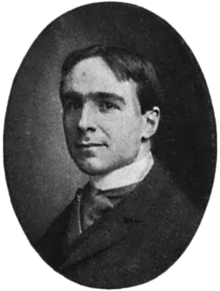Winston Churchill (writer)
Winston Churchill (born November 10, 1871 in St. Louis , Missouri , † March 12, 1947 in Winter Park , Florida ), called "the American", was an American writer . Churchill was most successful as a novelist , but he also published essays and poems .
Life
Churchill was the son of Edward Spalding Churchill and his wife Emma Bell Blaine. He attended Smith Academy in Missouri and the United States Naval Academy, which he graduated in 1894. He then became an editor for the Army and Navy Journal . He eventually left the American Navy to devote himself entirely to writing.
In 1899 Churchill moved to Cornish , New Hampshire . There he worked, whose works mostly showed a combative political impetus, henceforth as a professional politician. In 1903 and 1905 he was elected as a member of the state parliament, in 1906 he was even nominated for the office of governor by the Republican Party without being able to take office because he was defeated in the elections. In 1912 he was nominated for the Progressive Party as a candidate for the same office, but lost again. In 1917 he traveled to the battlefields of the First World War and wrote an experience report about the impressions he had gained in Europe. During this time, Winston Churchill worked with the then Secretary of State for Naval Affairs in Washington, Franklin Delano Roosevelt, who acted as his journalistic mouthpiece.
In 1919 Churchill decided to withdraw from the public for the time being in order to contemplate. He took a creative break and withdrew from the public eye. In 1940 he published The Uncharted Way, his first book in over twenty years. The book was a compilation of his thoughts on religion . Churchill died in Winter Park in 1947 . His great-grandson is the journalist Chris Churchill.
In 1908 he was elected to the American Academy of Arts and Letters .
Relationship with the British statesman Winston Churchill
Regardless of the equality of their first names and surnames - within the genealogically manageable period of time - there is no family connection between the American writer and the famous British politician and Prime Minister Sir Winston Churchill . Since the Briton was active as a writer just like his American namesake , and the works of both authors were also published by the same publishing house (Macmillan) at the time, the two agreed at the turn of the century that the American should publish his works as "Winston Churchill" should, while the Briton would publish his books with the addition of his middle name "Spencer" as "Winston S. Churchill". The American's first right of access to the common nickname resulted from his earlier journalistic activity. The two Churchills corresponded occasionally and sent each other copies of their works. The two met in Chicago in 1900 while Winston S. Churchill was on a reading tour for his book From London to Ladysmith via Pretoria in the United States.
Works
Churchill published his first novel The Celebrity in 1898 . His second book was Richard Carvel from 1899, which sold over two million copies and made Churchill rich. It was followed by The Crisis (1901) and The Crossing (1904). While the early works were historical novels , Churchill's later works set in contemporary America. Four of his books were made into films from 1915 to 1921.
bibliography
- The Celebrity (1898)
- Richard Carvel (1899)
- The Crisis (1901)
- The Crossing (1904)
- Coniston (1906)
- Mr. Crewe's Career (1908)
- A Modern Chronicle (1910)
- The Inside of the Cup (1913)
- A Far Country (1915)
- The Dwelling-Place of Light (1917)
- The Uncharted Way (1940)
literature
- Robert W. Schneider: " Five Novelists of the Progressive Era ", 1965.
- Robert W. Schneider: " Novelist to a Generation: The life and Thought of Winston Churchill ", 1976.
Web links
- Literature by and about Winston Churchill in the catalog of the German National Library
- Winston Churchill in the Internet Movie Database (English)
Individual evidence
- ^ Members: Winston Churchill. American Academy of Arts and Letters, accessed February 22, 2019 .
| personal data | |
|---|---|
| SURNAME | Churchill, Winston |
| ALTERNATIVE NAMES | the American |
| BRIEF DESCRIPTION | American author |
| DATE OF BIRTH | November 10, 1871 |
| PLACE OF BIRTH | St. Louis , Missouri |
| DATE OF DEATH | March 12, 1947 |
| Place of death | Winter Park , Florida |
